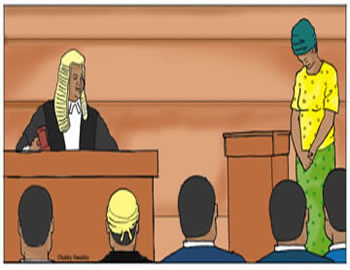Annulment is the determination by a court that a supposed marriage was never legally valid. Marriages subject to annulment proceedings are classified as void. On the contrary, divorce is a legislatively created, judicially administered process that legally terminates a marriage no longer considered viable by one or both of the spouses and that permits both to remarry.
Over the years, in Nigeria, religion has played a critical role in marriage and divorce. Before some men marry under traditional religion, they would consult the oracle to enquire the long-time feasibility of the marriage. Some Christians also enquire from God through pastors or prophets. Likewise, some Muslims consult imams before marriage. Many male Muslims would prefer to marry another woman than to divorce their wives.
Irrespective of the religious stance of divorce, there are many who perceive it as a normal way of life. A growing number of expert observers conclude that high divorce rate is due to a number of social changes that are the cause rather than the consequence of divorce-law reform.
In contemporary Nigeria, divorce is increasing with certain types of lifestyles and movements that have satiated the society such as increasing spousal irresponsibility, career woman ideology, feminism, among others. These days, it seems people are going into marriages with the mindset that it might probably end in a divorce.
These indices led the US rock singer and songwriter, Lou Reed, to say, “Everyone should have a divorce once. I can recommend it.” Furthermore, the US novelist and naturalist, Edward Hoagland, opined, “The great leveler nowadays is divorce; almost everybody thinks about it, whether because we expect to be happy all the time—daily, weekly—or because we want the smell of brimstone in lives made too affluent and easy.”
There are many causes of divorce that this piece may not be able to properly cover them. However, for space and clarity, some of the causes would be briefly and collectively touched on.
Toke Makinwa and Maje Ayida, in their article titled “Eight Reasons why Divorce Rate seems to be High in Nigeria”, list sexual issues, superiority complex, rushing into marriage, infidelity, financial issues, infertility, westernisation, and poor communication as major causes of divorce in Nigeria.
In recent times, increase in divorce among Nigerian couples has caught the attention of the National Council of Women Society (NCWS). In a one-day seminar held in Ilorin, tagged: The Impact of Divorce, Broken Homes, and Marriages on Youth Development in Nigeria, the president of the council, Hajiya Barakat Atunse, stated, “We have to find a way to curb the increasing rate of divorce to preserve the sanctity of marriage and build happier and well-rounded homes.”
What are lawyers and court records saying? Not quite long ago, some Abuja-based lawyers decried the high rate of divorce cases in courts. Some of them noted that many people marry without knowing the dos and don’ts of the marriage institution. A record of divorce obtained from an FTC High Court showed that twenty-four divorce cases were filed from January to March 2017 in that court alone.
Shola Adekola and others, while trying to unravel why couples are not keeping their conjugal vows in Lagos in a Nigerian Tribune article titled “Divorce epidemic in Lagos, 30,000 cases in Badegry alone”, lamented that Lagos couples hardly live happily ever after.
A lawyer, Christie Nwaka, stressed, “People are always deceived by physical appearance or wealth, and there are usually serious challenges when people who come together because of mundane things are confronted with serious issues.”
Once one jumps into marriage without taking the right steps, there is a tendency for failure. A healthy and mutual courtship is imperative in a marriage. More importantly, patience and respect are vital in sustaining it.
Trust is one of the crucial factors that determine the continuity of a marriage. It is the pillar of every relationship. If a couple does not trust each other, seldom would love exist between them. One better knows a partner that understands when the storm comes.
When one or both couple allows a third party to interfere in their marriage, it might negatively affect the tenants of their relationship or introduce unhealthy elements in their lives. Third parties would not know or understand a spouse the way his or her partner does. They would only judge from what they are told or from what they perceive. On the other hand, this does not mean that third parties are not necessary in a marriage. There have been instances where they have helped to avert separation and divorce.
The effect of divorce on the family and society cannot be overemphasised. Sometimes, the children, if any, bear the brunt. The psychological effects and the social stigmatisation associated with divorce could affect the children’s education and mental development. Some experts have argued that children from divorced parents seem to engage more in substance abuse and social ills than children from non-divorced parents.
The effects of divorce on the couple abound. Though both spouses are affected by it, women feel the effect more. This prompted the British writer and journalist, Cyril Connolly, to state, “There is no fury like an ex-wife searching for a new lover.”
There seems to be no exact prescription on how to prevent divorce because each couple has their own unique problem. However, some basic healthy lifestyles and orientations could suffice to sustaining a marriage.
Regular connection and meaningful conversations between spouses are vital. Couples should be open about their marriages and their lives. They should ensure their partners are their best friends not just their partners. An expert once said, “The key to marital happiness and success is friendship.”
Faithfulness is another ingredient. According to some experts, 95 percent of spouses agreed that fidelity is essential to a successful marriage. Professional marriage counselling is needed for couples at the verge of divorce or separation. This could help to avert a lot of marital problems.
At this juncture, it is important to point out that divorce is not entirely bad. In many instances, it has been a relief to a dysfunctional or an unproductive marriage. However, if it possible to prevent divorce, it is advisable to do so.
Above all, patience, forgiveness, understanding, sacrifice, encouragement and love must not be removed from the equations of a relationship. The more willing spouses are able to demonstrate these noble traits in their marriages, the more chances they have to avoid divorce.
Comfort Oyedokun and Kingsley Alumona are with the Nigerian Tribune






